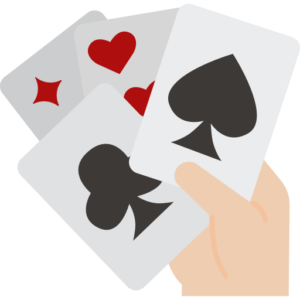Glossary Term
Fold
Fold
Used In: Poker
Introduction
In poker, the term “fold” refers to the action of discarding your hand and ending your participation in the current round. When a player folds, they give up any chance of winning the pot for that hand and forfeit the chips they’ve already put into the game. Folding is a strategic decision, made when a player believes their hand is weak or unlikely to improve, and continuing to play would only lead to further losses. It is an essential part of poker strategy, as knowing when to fold can protect a player from costly mistakes and prevent them from losing more money on hands that are not worth pursuing.
The decision to fold is often based on the strength of a player's hand, the community cards, and the actions of the other players. For example, if a player is holding a weak hand that doesn’t show any improvement after the flop, turn, or river, they might decide it’s better to fold and save their chips for a better opportunity. Additionally, if an opponent makes a strong bet or raise, a player might fold if they think they are facing a stronger hand, choosing to cut their losses instead of risking more chips on a losing proposition. In these cases, folding is a sign of discipline and good judgment.
Folding is not always a sign of weakness but rather a strategic choice that separates skilled players from beginners. While it might be tempting to stay in a hand to see how it plays out, especially in situations with emotional involvement or the hope of a lucky draw, experienced players know that folding at the right time is key to maintaining a profitable poker game. A player who folds when necessary minimizes the potential for large losses, allowing them to preserve their chips for future hands where they have a better chance of winning. Thus, folding is a fundamental skill that plays a crucial role in a successful poker strategy.
In Depth Look
Poker is a card game that combines skill, strategy, and psychology, with the goal of winning chips or money from other players by having the best hand or by convincing others to fold. At its core, poker involves betting rounds where players choose to either bet, call, raise, or fold depending on the strength of their hand and their read on other players. The game is typically played with a standard deck of 52 cards, and the combination of community cards and hole cards (private cards dealt to each player) determines the strength of each player’s hand. Poker also involves an element of bluffing, where players try to mislead their opponents about the strength of their hand, making the game as much about psychology and observation as it is about the cards themselves.
Poker has many variations, with Texas Hold’em and Omaha being the most popular. Each variant has its own set of rules, but the fundamental mechanics remain the same. Players need to make decisions based on the strength of their hand, the community cards, the betting actions of others, and the likelihood of their opponents having better hands. Poker is often described as a game of incomplete information, as players cannot see their opponents' cards and must rely on their understanding of probabilities, game theory, and human behavior. Success in poker requires both knowledge of the game and the ability to adapt to constantly changing dynamics at the table, as well as managing risks and emotions.
Mechanics
The mechanics of poker revolve around a series of structured betting rounds, each of which influences how the game progresses and how players make decisions. At the start of a hand, players are dealt a set of hole cards (private cards), which only they can see. The dealer then places community cards in the center of the table, visible to all players. In most poker variants, the game proceeds through a sequence of betting rounds, starting with the pre-flop, where players make their first decision based on their hole cards. After each round of betting, community cards are dealt face-up, such as the flop (three cards), the turn (one card), and the river (one final card). Players continuously assess the strength of their hand based on these shared cards and make their decisions accordingly.
During the betting rounds, players can choose to take several actions. They can check, meaning they pass their turn without betting; bet, meaning they put chips into the pot; call, meaning they match the current bet of another player; raise, meaning they increase the current bet; or fold, meaning they discard their hand and exit the round. Each player’s action in a round is influenced by the cards they hold, the community cards, the betting patterns of others, and their position at the table. As the hand progresses, the betting rounds grow increasingly critical, with players seeking to gauge their opponents' strategies and calculate the odds of improving their hand.
In poker, the goal is to either have the best hand at the showdown or to bluff your opponents into folding their hands, allowing you to win the pot without showing your cards. The hand rankings, which determine which hands beat others, are critical for players to understand. For instance, a royal flush is the highest-ranking hand, while a high card is the lowest. The outcome of a hand can also be influenced by factors like pot odds, which involve comparing the potential size of the pot to the cost of a call, and expected value, a concept in game theory that helps players make decisions based on probabilities. Poker, at its core, is about making the most informed and strategic decisions based on incomplete information while managing risks and emotions.


Illustrated Example
Imagine you're playing a hand of Texas Hold'em, and you're dealt a starting hand of 9♠ 2♣, one of the weakest hands in the game. The player before you raises the bet, and while you’re tempted to stay in, you know that the odds are against you. You also know that your 9♠ 2♣ has little chance of improving on the flop, turn, or river. Instead of calling or raising, you decide to fold. By doing so, you save your chips and avoid making a costly mistake that would likely lead to a loss. Folding in this situation is a smart move, as it’s better to cut your losses and wait for a stronger hand to play.
Later in the game, you’re dealt a hand of K♣ 10♠. The flop comes down as A♥ 7♠ 2♦, which doesn’t improve your hand at all. One of the players on the table makes a significant bet, and while you may have some interest in staying in, you realize that the A♥ on the board likely means someone else has a stronger hand. With no further improvement coming from your cards, you choose to fold. This decision allows you to avoid risking more chips in a hand you’re unlikely to win, demonstrating how folding can help you preserve your stack and make more strategic moves later in the game.
Player Perspective
From a player's perspective, folding is often seen as a sign of discipline and strategic thinking. Experienced players know that poker is not just about playing as many hands as possible, but about playing the right hands at the right time. When faced with a weak hand or unfavorable situation, folding allows players to minimize their losses and avoid unnecessary risks. While beginners may feel the urge to stay in every hand, seasoned players understand that folding is an essential part of maintaining a strong poker strategy. By folding, they protect their chips and ensure that they don’t put themselves in tough spots that could drain their stack.
Folding also plays a key role in managing emotions and staying focused during a long session. Poker is a game of patience, and sometimes, letting go of a hand is the best decision to stay in the game for the long haul. Even when players are invested in a hand, knowing when to fold can be critical to their success. For instance, folding a hand like a pair of 7s when facing a large bet can be tough, but a smart player will recognize the danger and cut their losses. Over time, players learn to embrace folding as a necessary skill that helps them stay ahead and avoid losing more chips on hands with little potential.
Conclusion
Folding is a vital skill in poker that separates successful players from those who struggle. It’s not about giving up, but rather about making smart, calculated decisions to protect your chips and avoid costly mistakes. By folding when necessary, players conserve their resources for better opportunities and maintain control of their strategy. While it can be tempting to stay in a hand, especially when emotions are involved, understanding when to fold is crucial for long-term success. Ultimately, folding helps players manage risk, preserve their stack, and improve their overall performance at the table.
The Top Online Casinos for Playing Poker
These platforms prioritize player satisfaction by providing intuitive interfaces, seamless gameplay experiences, and robust security measures to ensure a fair and enjoyable environment for all users.
No results were found!


Author
Branimir Ivanov | Senior News Contributor








